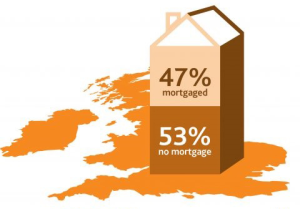
27 Nov Lack of Stock Drives High Rental Prices
We’re all aware that there’s a cost of living crisis going on, and it seems as though almost every aspect of daily life is becoming affected by spiralling costs. As UK interest levels reach a 41 year high, the Consumer Prices Index (CPI) found that by October 2022, the cost of goods has risen by an average of 11% on last year.
The Impact On Housing
The housing market has not remained immune to the economic changes. The impact of soaring inflation is likely to be particularly hard for those who are in rented accommodation, as the economic factors add to a number of other challenges. In addition to the increase to the cost of borrowing, a simple lack of housing stock means that records for rental prices across England and Wales are being broken again and again. Indeed, the cost of renting a home has risen by almost 16% over the last three months, as reported by the Standard
Now, the average rent for a prime property in London has reached a staggering £5000 a month, which represents a real term increase of almost £200 a week on 2021 prices. Perhaps as a result of these rental increases, property search website RightMove reports a surge in interest in smaller properties to rent, including studio apartments, which have now overtaken single bedroom properties as the most desirable places to rent.
A Widespread Issue
With an estimated four million households currently living in rental accommodation, it’s not a problem that can be overlooked. The majority of rental properties are owned by private landlords, who will, of course, face their own challenges as a result of the current economic climate. Whilst there are initiatives in place to increase the volume of rental stock, such as the Build To Rent programme, it’s still the case that fewer than 50% of landlords are aware of such schemes. Campaigners are petitioning the UK government to take action, yet the proposed Renter’s Reform Bill does not, as yet, include any measures to cap or curb the soaring private rental prices.
Many see buying a property as a way out of paying high rents, but this is an expensive prospect. From the challenge of saving for a deposit and the decrease in available mortgage products, buyers will be faced with a range of other costs, whether a home buyers survey Nottingham, to a conveyancing bill in Milton Keynes. For those planning to buy, consulting with experts such as Sam Conveyancing is a good first step.
The Future For Rentals
Right now, the situation looks rather bleak for anyone hoping to move into a rented home. Figures suggest that there were 38% fewer rental properties available in June of this year compared to June 2021, whilst interest in renting such properties had increased by 60%. The outlook is brighter for those renting designated “affordable housing”, as the government is considering a 6-7% cap on rental increases for such properties, as well as limiting rental increases to once a year. They also say that the planned Renter’s Reform Bill will give renters more power to challenge high rental increases by private landlords. It is hoped that the economic situation will improve into spring / summer 2023.



